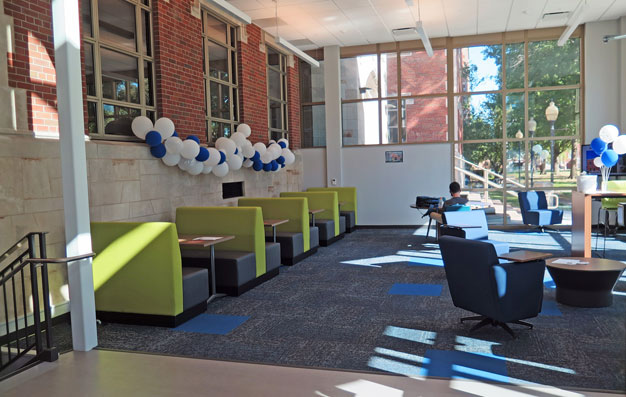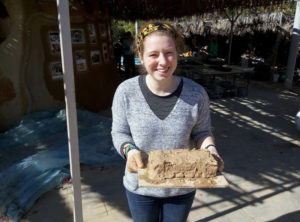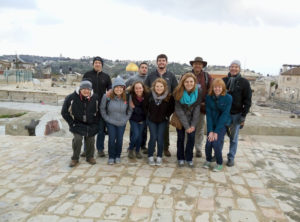
A student studies in the new addition of McMullen Hall at St. Ambrose University in Davenport. McMullen Hall is now the home to the College of Business.
By Anne Marie Amacher
The Catholic Messenger
DAVENPORT — The College of Business programs at St. Ambrose University are together in one home, following several years of discussions, planning and construction of an addition to McMullen Hall.
St. Ambrose University (SAU) leaders began talking about a central site since at least 2016, said Maritza Espina, dean of the College of Business. Prior to the 2020-21 school year, business college faculty had offices in Ambrose Hall but taught classes in several buildings. The business college offers eight undergraduate majors and four graduate degree programs. “We didn’t have a sense of community,” she said. Mike Poster, vice president for finance, agreed. “They didn’t have a place of their own.”
McMullen Hall, built in the 1940s and renovated in the 1990s, was chosen for the business college’s home. Work began in spring of 2019 on the $8.6 million renovation and a 15,600-square-foot addition.
The addition features an atrium, six classrooms to accommodate new methods of learning and teaching, two computer labs, a finance lab, sales lab, co-curricular lab and lecture hall. Multi-functional classroom space and a commons area fill out the rest of the addition. The original building underwent renovation for office space for faculty and staff and larger, more adaptive classrooms.
Work continued on the building over the winter, spring and through the coronavirus pandemic, Espina said. Faculty and staff had been working remotely during the second half of the spring semester after classes moved to online format because of the pandemic. When permissible, workers moved offices and classroom materials and furniture to McMullen Hall following the close of the 2019-2020 academic year and over the summer.
The move “helped us through COVID-19,” Espina said. It gave the faculty, staff and students something to look forward to when they returned to campus in August. “We have new technology, new equipment and new classrooms.”
She said students make good use of the commons area while maintaining social distancing and wearing face masks. “It’s great to see them here.” In the early weeks of the new academic year, students participated in a contest to name the commons area. Faculty and staff are reviewing the 40 contest submissions before narrowing the list and making a final selection, Espina said.
Many of the classrooms are larger than the business college department’s previous classrooms, so social distancing has not been a problem. Espina appreciates the mix of old and new between building sections and the way they flow together.
The exterior brick wall of the original building has been incorporated into the atrium area wall. “They blended modern and old together and preserved history,” Espina said. The College of Business has wish list of items it hopes to purchase in the future. As donations come in, more items can be added, she noted.
The Professional Development Center, which offers a non-credit program that trains people in area businesses, also has moved into McMullen Hall. “We can do training and seminars for them.”
The north campus facility on 54th Street in Davenport offers additional training. That site formerly housed the graduate programs. The social work department has moved some of its resources to that campus building.
The next Master of Business Administration evening session begins in October and applications have started coming in. Enrollment in the College of Business has increased this academic year, Poster noted. “It’s a great place for businesses to meet with our students in a modern facility. It looks like a professional building inside.”








